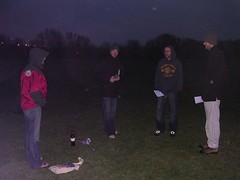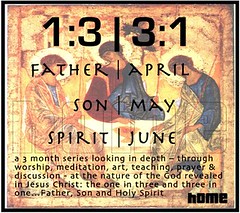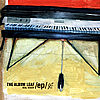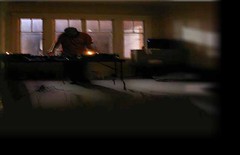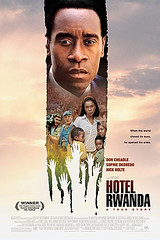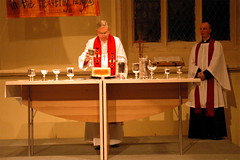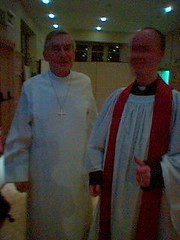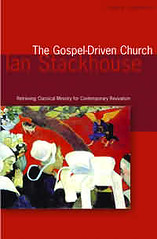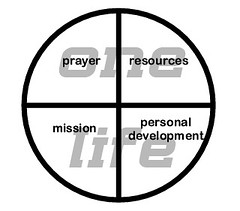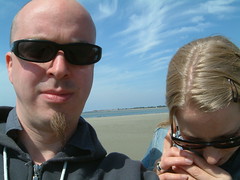Wednesday, March 30, 2005
Tuesday, March 29, 2005
hOME: new series
today we are announcing a new series which we will be engaging with in hOME over the next 3 months. we wanted to really focus in on who God is...so we're going to spend a month on each person of the trinity: a month on the Father, a month on the Son, and a month on the Spirit. and we're going to come at it from lots of different angles - teaching, worship, art, discussion etc. through our central meetings and our huddles.
Thursday, March 24, 2005
The Album Leaf - Seal Beach EP
One of the dangers of listening to 'Groove Salad' on SOMA FM over the internet (see yesterday's post) is that you hear some absolutely beautiful music that you really want in your collection. this is certainly true of the 'Seal Beach' EP by a bloke that calls himself 'The Album Leaf' (real name Jimmy Lavelle, from San Diego, CA). Heard a track from it the other day, found it cheap on Amazon, and it arrived this morning. it certainly lives up to my expectations - achingly beautiful, rhodes-heavy, electronica (and some 'real' instrument downtempo stuff). I think it will be feauturing in some of our services soon. get it here!
Wednesday, March 23, 2005
Tom and Christine Sine at SPEAK
We really enjoyed having Tom and Christine Sine come and speak at hOME last year. they're back in the country next month. i've been sent the following details:
"Mission 4 Justice" ˆ April 15th, 7-9.30pm
Tom and Christine Sine are speaking on mission, justice, life and faith for
students and young adults. Tom and Christine are internationally known
speakers on Christian
social justice and action, and developing lifestyles of balance and peace in
the midst of a hectic world.
Venue: St Mary's Church, 57 Kennington Park Road, SE11 4JQ.
Nearest tube: Kennington or Elephant and Castle (10 minutes Walk).
Tickets are £5 available on the door.
They have been invited by SPEAK as part of the Trade Justice Global Week of
Action, 10-16 April - when thousands of campaigners all around the world
will be campaigning for trade justice. As you may remember, trade is one of
the 3 key issues (along with aid and debt) that's being addressed by the
Make Poverty History campaign.
see the SPEAK web site for more info:
"Mission 4 Justice" ˆ April 15th, 7-9.30pm
Tom and Christine Sine are speaking on mission, justice, life and faith for
students and young adults. Tom and Christine are internationally known
speakers on Christian
social justice and action, and developing lifestyles of balance and peace in
the midst of a hectic world.
Venue: St Mary's Church, 57 Kennington Park Road, SE11 4JQ.
Nearest tube: Kennington or Elephant and Castle (10 minutes Walk).
Tickets are £5 available on the door.
They have been invited by SPEAK as part of the Trade Justice Global Week of
Action, 10-16 April - when thousands of campaigners all around the world
will be campaigning for trade justice. As you may remember, trade is one of
the 3 key issues (along with aid and debt) that's being addressed by the
Make Poverty History campaign.
see the SPEAK web site for more info:
Groove Salad from SOMA FM
i'm loving this amazing internet radio station from San Francisco. they are playing consistently fantastic downtempo, ambient and chill-out electronica, and what's more it's commercial-free. it's available through iTunes or through the SOMA web site. Go listen!
hotel Rwanda
Pip and I went to see this last night. it is truly an astonishing film and if you haven't seen it yet i really recommend that you do so. it beggars belief how people can inflict so much suffering on one another. and in the case of Rwanda it beggars belief how the rest of the world can just turn a blind eye to the suffering and genocide of a million people. the US and the UK were actually lobbying for the withdrawal of the few UN Peacekeepers that were actually even there.
as with Schindler's List there is a power in telling the story through one man which makes it so much more personal and so much more easy to relate to. watching the film made me even more keenly aware of what a responsibility the church has to seek the kingdom of God in the world and to be on the frontline of political campaigning and lobbying as well as direct relief efforts. cos this stuff is going on all the time....Darfur is being called 'Rwanda in slow motion' for example.
as part of our mission efforts in hOME we are hoping to see mission hUBS being involved in these sorts of issues, through things like letter writing etc. it's just a small contribution but hopefully it can still make a difference.
as with Schindler's List there is a power in telling the story through one man which makes it so much more personal and so much more easy to relate to. watching the film made me even more keenly aware of what a responsibility the church has to seek the kingdom of God in the world and to be on the frontline of political campaigning and lobbying as well as direct relief efforts. cos this stuff is going on all the time....Darfur is being called 'Rwanda in slow motion' for example.
as part of our mission efforts in hOME we are hoping to see mission hUBS being involved in these sorts of issues, through things like letter writing etc. it's just a small contribution but hopefully it can still make a difference.
Monday, March 21, 2005
the BIG ONE!
so, this week is the BIG ONE in the church year. yesterday we had a simple service of readings, meditation and prayer for Palm Sunday - focusing particularly on the fact that the same crowd that was welcoming Jesus as King was baying for his blood less than a week later. we also looked at how easy it is to follow Jesus when we think he's serving our agenda (which for the crowds on Palm Sunday was - to have a revolutionary king to overthrow the Romans), but how easy it is to turn away when God's agenda takes us by surprise. it was a nice, quiet, reflective service for just a handful of us.
tomorrow will be robed up and processing in the Cathedral for the annual 'Blessing of the Oils and Renewal of Ordination Vows' service that the Bishop leads each Holy Week. the oil is blessed and then taken back to parishes (of the non-geographic type in our case) to be used in prayer for healing. i think it's great that all (or should I say 'most' - the evangelical clergy are often conspicuous by their absence at these sorts of occasions) of the clergy from the Diocese have the chance to come together to re-affirm the vows they made at their ordination and I for one am looking forward to it.
On Maundy Thursday we will be joining with our Mother church - St Aldates - for a Passover Meal led by a Jewish guy - Joseph Steinberg. I went last year...you may not believe it but it was actually quite a laugh and interesting from a cultural point of view, as well as taking you deeper into the kind of meal Jesus would have celebrated on that night all those years ago.
On Good Friday we are going to gather again for another service of readings, prayers, and meditation, and then possibly to watch 'The Passion of the Christ' again - something that i guess a lot of groups will be doing on Friday.
On Easter Sunday morning hOME is going to experiment with an outdoor dawn service (for the hardy few!).
quite a week then!
tomorrow will be robed up and processing in the Cathedral for the annual 'Blessing of the Oils and Renewal of Ordination Vows' service that the Bishop leads each Holy Week. the oil is blessed and then taken back to parishes (of the non-geographic type in our case) to be used in prayer for healing. i think it's great that all (or should I say 'most' - the evangelical clergy are often conspicuous by their absence at these sorts of occasions) of the clergy from the Diocese have the chance to come together to re-affirm the vows they made at their ordination and I for one am looking forward to it.
On Maundy Thursday we will be joining with our Mother church - St Aldates - for a Passover Meal led by a Jewish guy - Joseph Steinberg. I went last year...you may not believe it but it was actually quite a laugh and interesting from a cultural point of view, as well as taking you deeper into the kind of meal Jesus would have celebrated on that night all those years ago.
On Good Friday we are going to gather again for another service of readings, prayers, and meditation, and then possibly to watch 'The Passion of the Christ' again - something that i guess a lot of groups will be doing on Friday.
On Easter Sunday morning hOME is going to experiment with an outdoor dawn service (for the hardy few!).
quite a week then!
Monday, March 14, 2005
new hOME web site
our new web site has finally been (almost) finished. view it here. comments welcomed!
Friday, March 11, 2005
being truly counter-cultural
we have been reflecting recently on the amazingly transient nature of our generation - particularly in Oxford. on our recent weekend away, when people presented objects that represented hopes or dreams for the future, the vast majority of people spoke of something that involved travelling or living elsewhere. i'm not knocking that necessarily, but it has massive implications for building church together - when there is such a high turnover of relationships. for us in Oxford, it also has to do with things like the exorbitant price of housing which makes it very difficult to put down roots. anyway, there's a great piece from Jason about this sort of thing on his blog:
"Anyhow that got me mulling over, how despite the fact that our lives are so short, we get more and more fadish as a species. Maybe part of the postmodern condition is that we flit from one thing to another, unable to committ to anything, fadish, and living for the now, in our brief lives. Maybe being counter cultural isn't about not having sex, maybe it's about committment, to others, to settling, staying and dwelling. No one seems to stay any more. We withdraw as consumers at the drop of a hat, from work, places we live, friendships, our churches. Have we lost what it means to do life together in proximity, over time?
What if staying in one place, being accountable, working through the difficult issues of life, staying committed to each other rather than moving on to fresh fields, was one of the most radical things we could do. In a culture that tells us to keep our options open, in case we miss out, maybe we are called to lay aside our options for the sake of others.
What would our community look like if we built churches, that we did life together in for 40, 50 years of more, rather than micro churches that are here today and gone tommorow. To celebrate births, growing up of children, marriages, and deaths, to retell and incarnate the christian story with a group of people, in a place for the whole of our lives?
Or are we keeping our options open, scared of missing out on something better, when maybe we have something better within our grasp already?
In a life that is brief, maybe the biggest risk I can take is to stay where I am, to invest everything I have and not leave, to dwell, to develop long memories and connections to a place and people."
"Anyhow that got me mulling over, how despite the fact that our lives are so short, we get more and more fadish as a species. Maybe part of the postmodern condition is that we flit from one thing to another, unable to committ to anything, fadish, and living for the now, in our brief lives. Maybe being counter cultural isn't about not having sex, maybe it's about committment, to others, to settling, staying and dwelling. No one seems to stay any more. We withdraw as consumers at the drop of a hat, from work, places we live, friendships, our churches. Have we lost what it means to do life together in proximity, over time?
What if staying in one place, being accountable, working through the difficult issues of life, staying committed to each other rather than moving on to fresh fields, was one of the most radical things we could do. In a culture that tells us to keep our options open, in case we miss out, maybe we are called to lay aside our options for the sake of others.
What would our community look like if we built churches, that we did life together in for 40, 50 years of more, rather than micro churches that are here today and gone tommorow. To celebrate births, growing up of children, marriages, and deaths, to retell and incarnate the christian story with a group of people, in a place for the whole of our lives?
Or are we keeping our options open, scared of missing out on something better, when maybe we have something better within our grasp already?
In a life that is brief, maybe the biggest risk I can take is to stay where I am, to invest everything I have and not leave, to dwell, to develop long memories and connections to a place and people."
Thursday, March 10, 2005
DJing tonight
myself and another hOMEboy - Gareth - are DJ ing at the Thirst Bar tonight. definitely one of the nicer bars in town. we'll be spinning some quality house music down there from around 11pm onwards if anyone fancies coming down.
Wednesday, March 09, 2005
Monday, March 07, 2005
food for the soul....
just read the whole of the Eugene Peterson interview i quoted in the entry below. it really is worth the read. excellent stuff. find it here.
clerical dress, hmmmm....
last night we had a confirmation service at St Aldates, the mother church of hOME. whenever the bishop comes one of the clergy at the church acts as his chaplain for the evening - carrying his crook, holding his service sheet for him to read from, and generally making sure he's ok. last night it was my turn. here's a pic. apologies for the poor quality of the photo...it was taken on my phone in poor light.
a number of people made the usual jibes about the whole dressing up thing. understandably so. it doesn't happen very often so it's always a bit of a novelty for people, and also for me i guess. people assumed that i must have hated it but actually i found it to be quite a privilege. the Bishop of Oxford has been kind to me and it was great to be able to do a little something for him. it did make me wonder about the whole 'robes' thing though. i can definitely see two sides to it. a good friend of mine suggested to me years ago that as soon as you put a dog collar on you lose your 'annointing' (not language i would use but you know what he meant, i'm sure). his point was that Jesus never appealed to an office as the source of his power - he was an ordinary man filled with the power of God. the donning of clerical gear appeals to a sense of status in order to gain power. i have a certain sympathy with that outlook.
on the other hand, last night i reflected on the fact that me wearing robes said something about what was important to me without me having to use words. the clothes expressed something of who i was - not in a "do you know who I am?" sort of way, but more to do with saying something about a vocation that God has called me to. we so often rely on words to express those things. wearing robes is a way of speaking about what is important in a visual rather than a verbal way.
I guess another reason we DON'T wear robes (apart from wanting to obliterate the clergy/laity divide - and i'm all for the abolition of the laity) is to somehow be 'culturally relevant'.It would seem that the mighty Eugene Peterson, for one, is dead against the idea of the pursuit of cultural relevance. I read him on the subject - from an interview in Christianity Today - at this blog. Here's a little snippet from Eugene to whet your appetite:
"I think relevance is a crock. I don't think people care a whole lot about what kind of music you have or how you shape the service. They want a place where God is taken seriously, where they're taken seriously, where there is no manipulation of their emotions or their consumer needs."
I think Eugene's got a point but for me what we're about is not primarily about relevance. I've blogged previously about how i think cultural relevance doesn't make sense if the aim is to be incarnational (you don't need to tell a Japanese person living in Japan to try to be relevant to their culture). any other comments?
a number of people made the usual jibes about the whole dressing up thing. understandably so. it doesn't happen very often so it's always a bit of a novelty for people, and also for me i guess. people assumed that i must have hated it but actually i found it to be quite a privilege. the Bishop of Oxford has been kind to me and it was great to be able to do a little something for him. it did make me wonder about the whole 'robes' thing though. i can definitely see two sides to it. a good friend of mine suggested to me years ago that as soon as you put a dog collar on you lose your 'annointing' (not language i would use but you know what he meant, i'm sure). his point was that Jesus never appealed to an office as the source of his power - he was an ordinary man filled with the power of God. the donning of clerical gear appeals to a sense of status in order to gain power. i have a certain sympathy with that outlook.
on the other hand, last night i reflected on the fact that me wearing robes said something about what was important to me without me having to use words. the clothes expressed something of who i was - not in a "do you know who I am?" sort of way, but more to do with saying something about a vocation that God has called me to. we so often rely on words to express those things. wearing robes is a way of speaking about what is important in a visual rather than a verbal way.
I guess another reason we DON'T wear robes (apart from wanting to obliterate the clergy/laity divide - and i'm all for the abolition of the laity) is to somehow be 'culturally relevant'.It would seem that the mighty Eugene Peterson, for one, is dead against the idea of the pursuit of cultural relevance. I read him on the subject - from an interview in Christianity Today - at this blog. Here's a little snippet from Eugene to whet your appetite:
"I think relevance is a crock. I don't think people care a whole lot about what kind of music you have or how you shape the service. They want a place where God is taken seriously, where they're taken seriously, where there is no manipulation of their emotions or their consumer needs."
I think Eugene's got a point but for me what we're about is not primarily about relevance. I've blogged previously about how i think cultural relevance doesn't make sense if the aim is to be incarnational (you don't need to tell a Japanese person living in Japan to try to be relevant to their culture). any other comments?
Saturday, March 05, 2005
hOME in today's Times
along with other fresh expressions of church in the Oxford Diocese, hOME makes a brief appearance in an article in today's Times. you can read it here.
Friday, March 04, 2005
Gospel-Driven Church
On the whole i'm enjoying Ian Stackhouse's book (which a lot of people seem to be reading) although i'm not sure i agree with everything he has to say (he's coming from quite a Reformed, Calvinist perspective that doesn't sit that comfortably with me, for example). his contention that much evangelical spirituality is predicated on the idea that by raising the spiritual temperature (i.e. working harder in prayer etc.) we can somehow precipitate a 'move of God' seems insightful to me. there's certainly a lot of that sort of 'COME ON!' thinking in the contemporary church. over the years i have seen many people give up on church when the revival that has been promised for so long has failed to materialise. year after year they were told that 'this is the year of the favour of the Lord' (not so sure that this was exactly what Isaiah had in mind). disillusionment was always just around the corner. for some time now i have felt drawn to a spirituality that has more to do with spiritual formation through the faithful practice of the spiritual disciplines in community. For Stackhouse, much contemporary evangelical spirituality is almost Old Testament in its character: continually pursuing something more from God (like there's something missing) rather than trusting and resting in what has already been accomplished through Christ. it's a fine line though, i guess, isn't it? not many of us would want to disagree with St Bono when he said, "I still haven't found what I'm looking for". It's that pesky 'already, but not yet' eschatological thing again.
One thing that has struck me about Stackhouse's book is his missiology, or rather, a lack of one. admittedly i have not yet finished reading it but he doesn't seem to have one in what i've read so far and, flicking through the rest of the book, it doesn't look like one is coming. perhaps this book does not include missiology within its remit but in what it does contain i am picking up a sense that for Stackhouse, in an almost Anglo-Catholic sense, mission is about getting the church right, being faithful.
"the formation of a...charismatic, evangelical community, under the Word and the sacraments, and empowered by the Holy Spirit of God, is the ultimate proclamation of the gospel" (p.178)
Now I am one of the first to say that one of the best ways to do mission is to plant new expressions of church, i.e. that doing church is a good way to do mission, but Stackhouse seems to reduce the task of mission to the pursuit of a faithful church life. what about the missio dei? what about seeking, and attending to, the kingdom in the world? perhaps i've misread him. would anyone else who's read the book care to comment?
One thing that has struck me about Stackhouse's book is his missiology, or rather, a lack of one. admittedly i have not yet finished reading it but he doesn't seem to have one in what i've read so far and, flicking through the rest of the book, it doesn't look like one is coming. perhaps this book does not include missiology within its remit but in what it does contain i am picking up a sense that for Stackhouse, in an almost Anglo-Catholic sense, mission is about getting the church right, being faithful.
"the formation of a...charismatic, evangelical community, under the Word and the sacraments, and empowered by the Holy Spirit of God, is the ultimate proclamation of the gospel" (p.178)
Now I am one of the first to say that one of the best ways to do mission is to plant new expressions of church, i.e. that doing church is a good way to do mission, but Stackhouse seems to reduce the task of mission to the pursuit of a faithful church life. what about the missio dei? what about seeking, and attending to, the kingdom in the world? perhaps i've misread him. would anyone else who's read the book care to comment?
bush vs jesus
this was brought to my attention by Chris. you'll need to click on it to get it large enough to read the text. worth a look though.
Wednesday, March 02, 2005
'To clarify this Journey...'
I'm taking the risk of cutting pasting an entire article rather than just linking to it, cos i think it's such a great piece and i resonate with it so deeply. i wouldn't want you to not follow the link! to view the article, by Brother Maynard, in its original context at emergingchurch.info go here. there are a couple of minor questions i would want to ask about a couple of points but that should wait for another time so as not to lessen the impact. enjoy..
"Seems there’s some misunderstanding about the journey we’re on. To some, it looks like the journey to leave the church we’re in… which to me is evidence that we aren’t explaining it very well. Given that observation, I thought it might help to take another stab at it in hopes of clarifying it in my own mind if nowhere else.
I long for a church that is low-key. I’m tired of hype, I’m tired of noise, and I’m tired of intensity. I used to like all those things, but I no longer equate these with “signs of life.” I long for something more contemplative, a place that can acknowledge worship as being intellectual as well as emotional.
I long for a church with deep interpersonal relationships. I was attracted to a place that talked about relationships and tried to build relationally, but with growth, time, and change, what started as relational has become merely functional. Faith walks need camaradarie, lives shared one with another
I long for the attainable challenge of Jesus. Put the other way, I’m tired of being challenged, by which I refer not to the challenge of the gospel or the challenge of Jesus, but to the challenge of leaders who seem to continually push for greater levels of sanctification. Ever unattainable, this leaves one straining for an unreachable goal and feeling cast down for falling short. To elaborate, this causes a situation in which a believer perpetually feels or is actually considered “not quite good enough” to engage in ministry. I long for the challenges which God give the grace to attain, rather than the challenges of men which one strives fruitlessly to attain.
I long for a decentralized structure, and I long for servant leadership among peers. Power corrupts, which is a danger in the church as anywhere else… and a heirarchical structure is the breeding-ground for the corruption of church leaders. Jesus talked about this, about what can happen to church leaders who start well but end up enamoured with their positions. Practically speaking, this drives the necessity for decentralization so that the structures can be interrelated but independently manageable in smaller sizes.
I long for a culturally relevant church. I don’t understand why cross-cultural missionaries attempt to understand culture to present the gospel within it, while churches in the developed world tend to simply withdraw from their own culture, often condemning its evils. Unfortunately for them, our culture is filled with people who need to see real Christianity in action — they’ve seen enough caricatures of Christianity already. Being culturally relevant in the early 21st century means understanding -gasp!- postmodernism.
I long for a church that can be outwardly-focused without constantly pushing evangelism on the congregation, and for a church that does not relate evangelism with church growth as an end.
I long for a church that recognizes the value of ancient traditions. I’ve long been saddened by the iconophobia in many evangelical circles, discomfort with symbolism, suspicion toward any type of mysticism, and the ignoring of rich faith traditions from Advent to Passover.
I long for a church that is not uncomfortable with mystery or with the sacraments. The evangelical understanding I’ve been taught on the Eucharist is anemic, and the standard baptism explanation of “an outward symbol of an inward faith” misses the spiritual act, which still has an element of mystery in it.
I long for a church that recognizes the value of story. Scripture is story, and so are the lives it touches. One cannot presume to talk about relationship without recognizing the importance of personal stories.
So this is the path I’m on… I am seeking a place that is in pursuit of the things I long for. If I can’t find a place like that, I’ll find some people who are in pursuit of the things I long for, and together we’ll create such a place. The path I’m on is the pursuit of these things I long for in the church.
Is this path a reaction to church? Partly. It would be easy to list the things I don’t like about the church and give that as the reason to leave… but that really misses the heart of it. Please understand that I’m not mad at the church. I have been frustrated, but the path I’m on puts an end to the frustration and helps me to be able to avoid getting mad. To unpack that a little, I’ve tried for several years to change things. Big things, small things, things that bug me, things I think are wrong. Let’s just say there’s resistance, and leave it at that for now. It does tell me that this church will never be what I hope for, and efforts to change it will only result in frustration and/or pain. In other words, no good will come from my efforts to change it… it is what it is. Now, I’m not dismissing the church or writing it off. On the contrary, I consider it a part of my heritage; for many years it was a rich part, and something for which I’m deeply thankful. On the other hand, I’ve reached the point where I long for different things than the things I longed for when I first signed on.
So the basic thing about this journey is the same as about any journey… it’s not about the place we’re leaving, it’s about the place we’re going. Even if we don’t know where we’re going; it wouldn’t be the first such journey instigated by God."
"Seems there’s some misunderstanding about the journey we’re on. To some, it looks like the journey to leave the church we’re in… which to me is evidence that we aren’t explaining it very well. Given that observation, I thought it might help to take another stab at it in hopes of clarifying it in my own mind if nowhere else.
I long for a church that is low-key. I’m tired of hype, I’m tired of noise, and I’m tired of intensity. I used to like all those things, but I no longer equate these with “signs of life.” I long for something more contemplative, a place that can acknowledge worship as being intellectual as well as emotional.
I long for a church with deep interpersonal relationships. I was attracted to a place that talked about relationships and tried to build relationally, but with growth, time, and change, what started as relational has become merely functional. Faith walks need camaradarie, lives shared one with another
I long for the attainable challenge of Jesus. Put the other way, I’m tired of being challenged, by which I refer not to the challenge of the gospel or the challenge of Jesus, but to the challenge of leaders who seem to continually push for greater levels of sanctification. Ever unattainable, this leaves one straining for an unreachable goal and feeling cast down for falling short. To elaborate, this causes a situation in which a believer perpetually feels or is actually considered “not quite good enough” to engage in ministry. I long for the challenges which God give the grace to attain, rather than the challenges of men which one strives fruitlessly to attain.
I long for a decentralized structure, and I long for servant leadership among peers. Power corrupts, which is a danger in the church as anywhere else… and a heirarchical structure is the breeding-ground for the corruption of church leaders. Jesus talked about this, about what can happen to church leaders who start well but end up enamoured with their positions. Practically speaking, this drives the necessity for decentralization so that the structures can be interrelated but independently manageable in smaller sizes.
I long for a culturally relevant church. I don’t understand why cross-cultural missionaries attempt to understand culture to present the gospel within it, while churches in the developed world tend to simply withdraw from their own culture, often condemning its evils. Unfortunately for them, our culture is filled with people who need to see real Christianity in action — they’ve seen enough caricatures of Christianity already. Being culturally relevant in the early 21st century means understanding -gasp!- postmodernism.
I long for a church that can be outwardly-focused without constantly pushing evangelism on the congregation, and for a church that does not relate evangelism with church growth as an end.
I long for a church that recognizes the value of ancient traditions. I’ve long been saddened by the iconophobia in many evangelical circles, discomfort with symbolism, suspicion toward any type of mysticism, and the ignoring of rich faith traditions from Advent to Passover.
I long for a church that is not uncomfortable with mystery or with the sacraments. The evangelical understanding I’ve been taught on the Eucharist is anemic, and the standard baptism explanation of “an outward symbol of an inward faith” misses the spiritual act, which still has an element of mystery in it.
I long for a church that recognizes the value of story. Scripture is story, and so are the lives it touches. One cannot presume to talk about relationship without recognizing the importance of personal stories.
So this is the path I’m on… I am seeking a place that is in pursuit of the things I long for. If I can’t find a place like that, I’ll find some people who are in pursuit of the things I long for, and together we’ll create such a place. The path I’m on is the pursuit of these things I long for in the church.
Is this path a reaction to church? Partly. It would be easy to list the things I don’t like about the church and give that as the reason to leave… but that really misses the heart of it. Please understand that I’m not mad at the church. I have been frustrated, but the path I’m on puts an end to the frustration and helps me to be able to avoid getting mad. To unpack that a little, I’ve tried for several years to change things. Big things, small things, things that bug me, things I think are wrong. Let’s just say there’s resistance, and leave it at that for now. It does tell me that this church will never be what I hope for, and efforts to change it will only result in frustration and/or pain. In other words, no good will come from my efforts to change it… it is what it is. Now, I’m not dismissing the church or writing it off. On the contrary, I consider it a part of my heritage; for many years it was a rich part, and something for which I’m deeply thankful. On the other hand, I’ve reached the point where I long for different things than the things I longed for when I first signed on.
So the basic thing about this journey is the same as about any journey… it’s not about the place we’re leaving, it’s about the place we’re going. Even if we don’t know where we’re going; it wouldn’t be the first such journey instigated by God."
Rule-of-Life
one of the things we do in hOME is explore the idea of living by a rule-of-life. some of us explore it more than others! we spent a chunk of time working on it at the weekend away. there are a number of aspects to what we do in hOME that are influenced by the monastic tradition and this is one of them. it starts from a recognition that, left to our own devices, we don't live the way we would ideally like to live. we tend towards a lack of focus. a rule-of-life is a tool to help us to overcome this. we wanted our Rule to be one that was holistic in nature i.e. traditionally discipleship has been thought about in terms of the 'spiritual' parts of our lives. we wanted a tool that would help us to be whole-life disciples. so our Rule operates in 4 areas (see diagram below) which help us to be holistic. we make S.M.A.R.T. commitments in each of these areas that we ask the others in our huddles (small groups) to hold us accountable for. the 4 areas come with 4 questions:
Prayer: what are you doing to develop your relationship with God?
Mission: what are you doing to share in God's mission in the world?
Resources: what are you doing with the things you have?
Personal Development: what are you doing to help you grow as a person?
so we make commitments in each area in answering those questions. these are not things put on us by others but things that we choose for ourselves. for example, someone might commit to reading a psalm before getting out of bed each morning etc. we look to make the commitments rhythmic and sustainable. this is a TOOl. the goal is not to practice the Rule-of-Life. the goal is to get to the point where we have found a rhythm to our lives that we have internalised, that has become second nature to us, that we live out of, and that helps us to live the way we want to live.
Prayer: what are you doing to develop your relationship with God?
Mission: what are you doing to share in God's mission in the world?
Resources: what are you doing with the things you have?
Personal Development: what are you doing to help you grow as a person?
so we make commitments in each area in answering those questions. these are not things put on us by others but things that we choose for ourselves. for example, someone might commit to reading a psalm before getting out of bed each morning etc. we look to make the commitments rhythmic and sustainable. this is a TOOl. the goal is not to practice the Rule-of-Life. the goal is to get to the point where we have found a rhythm to our lives that we have internalised, that has become second nature to us, that we live out of, and that helps us to live the way we want to live.
Subscribe to:
Comments (Atom)

